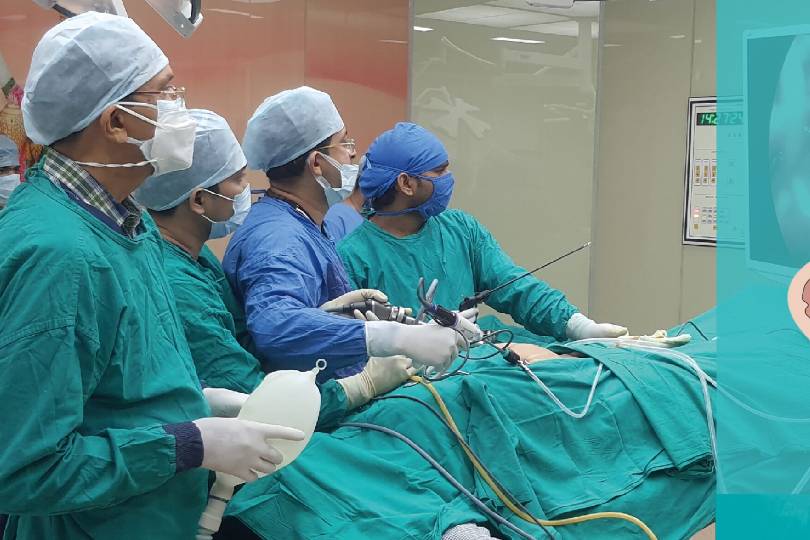RIRS Surgery for Kidney Stone Removal

What is RIRS Surgery?
Retrograde Intrarenal Surgery (RIRS) is an advanced, minimally invasive procedure used for kidney stone removal. It involves the use of a flexible ureteroscope that is inserted through the urethra, bladder, and ureter to reach the kidney stones. Dr. Uday Chandankhede, a renowned urologist in Baner, Pune, specializes in RIRS Surgery for Kidney Stone Removal, ensuring a safe and effective treatment for patients suffering from kidney stones.
Unlike traditional open surgery, RIRS is a non-invasive approach that offers faster recovery, minimal pain, and a high success rate in removing kidney stones.
When is RIRS Surgery Needed?
RIRS is recommended for patients who:
- Have kidney stones larger than 10mm that cannot be passed naturally.
- Have stones in difficult-to-reach areas of the kidney.
- Are not suitable for shock wave lithotripsy (ESWL) or PCNL (Percutaneous Nephrolithotomy).
- Have recurrent kidney stones despite dietary and medical management.
- Have medical conditions that make open surgery risky, such as obesity, bleeding disorders, or previous failed treatments.
Advantages of RIRS Surgery
🔹 Minimally Invasive – No cuts or stitches, reducing complications.
🔹 Faster Recovery – Most patients can go home the same day or within 24 hours.
🔹 Less Pain & Discomfort – As the surgery is performed using a ureteroscope, there is no major trauma to the kidney.
🔹 High Success Rate – RIRS effectively removes kidney stones with precision.
🔹 Suitable for High-Risk Patients – Safe for patients with bleeding disorders, obesity, or multiple failed procedures.
The RIRS Surgery Procedure
Step 1: Pre-Surgery Preparation
Before the surgery, Dr. Uday Chandankhede will conduct:
- A detailed medical evaluation to assess your kidney stone condition.
- Imaging tests such as ultrasound, CT scan, or X-ray to locate the stones.
- Blood tests to check for infections or underlying health conditions.
Step 2: The RIRS Procedure
1️. Anesthesia Administration – The procedure is performed under general or spinal anesthesia.
2. Insertion of Ureteroscope – A thin, flexible ureteroscope is passed through the urethra, bladder, and into the kidney.
3️. Stone Fragmentation – A laser (Holmium Laser) is used to break kidney stones into tiny fragments.
4️. Stone Removal – The fragments are either removed using a basket or left to pass naturally through urine.
5️. Post-Surgery Stent Placement – A temporary stent may be inserted to ensure smooth urine flow and prevent blockage.
The entire procedure typically takes 60 to 90 minutes, depending on the size and location of the stones.
Post-Surgery Recovery & Care 🏡
After RIRS Surgery for Kidney Stone Removal in Wakad, Pune, patients can expect:
- Minimal hospital stay – Most cases are discharged within a day.
- Mild discomfort – Some patients may experience slight burning sensation or blood in urine for a few days, which subsides naturally.
- Plenty of hydration – Drinking 2-3 liters of water daily helps flush out any remaining fragments.
- Follow-up visit – Dr. Uday Chandankhede will schedule a follow-up to ensure complete recovery.
Preventing Kidney Stones After RIRS Surgery
To reduce the risk of recurring kidney stones, follow these simple tips:
- Stay Hydrated – Drink at least 2-3 liters of water daily.
- Reduce Salt Intake – High sodium can contribute to stone formation.
- Limit Oxalate-Rich Foods – Avoid chocolates, spinach, beets, nuts, and tea.
- Maintain a Healthy Diet – Include fruits, vegetables, whole grains, and low-fat dairy.
- Regular Check-Ups – Periodic follow-ups with Dr. Uday Chandankhede to monitor kidney health.
Conclusion
RIRS Surgery is one of the most effective, safe, and minimally invasive methods for kidney stone removal. If you’re struggling with kidney stones and looking for RIRS Surgery for Kidney Stone Removal in Baner, Pune, Dr. Uday Chandankhede offers expert treatment with advanced technology and personalized care.
📞 Book an appointment today to get rid of kidney stones and enjoy a pain-free life!
📍 Location: Baner, Pune
☎ Call Now: 797284708
Our Services
About Dr. Uday Chandankhede
Dr. Uday Chandankhede is a highly skilled Uro-Oncologist and Robotic Surgeon with extensive experience in diagnosing and treating urological cancers. Proficient in laparoscopy and minimally invasive robotic surgeries, he is dedicated to advancing patient care in the field of uro-oncology through innovation, research, and precision-based surgical techniques.
Currently serving as a Consultant Uro-Oncologist and Robotic Surgeon at Urokul Hospital, Baner, Pune, Dr. Chandankhede has previously worked at Wockhardt Hospital, Nagpur, where he played a vital role in managing complex urological cancer cases. His expertise includes a wide range of procedures, including open, endoscopic, and robotic-assisted surgeries, making him a leader in modern urological treatments.
With a strong academic foundation, Dr. Chandankhede holds an MBBS degree from JNMC, Wardha, an MS in General Surgery from NSCB MCH, Jabalpur, and a DNB in Urology from NBE, Delhi. Further specializing in Uro-Oncology, he completed a fellowship at Tata Memorial Hospital, Mumbai, enhancing his skills in cancer management and robotic-assisted procedures.
In addition to his clinical work, Dr. Chandankhede is actively involved in research, with numerous publications in renowned medical journals. His contributions to uro-oncological advancements include studies on prognostic factors in bladder cancer, the impact of COVID-19 on cancer surgeries, and novel techniques in prostate and kidney cancer treatment.
Committed to continuous learning and professional development, Dr. Chandankhede has attended and presented at various national and international conferences, sharing his expertise on uro-oncology, robotic surgery, and andrology. He also participates in faculty-led workshops, training the next generation of surgeons in advanced surgical techniques.
At Urokul Hospital, Baner, Pune, Dr. Chandankhede remains dedicated to providing comprehensive, patient-centric care, ensuring the best possible outcomes for individuals battling urological cancers. His passion for innovation, surgical excellence, and compassionate care makes him a trusted name in the field of uro-oncology and robotic surgery.
